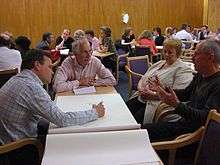World café (conversation)
A world café is a structured conversational process for knowledge sharing in which groups of people discuss a topic at several small tables like those in a café. Some degree of formality may be retained to make sure that everyone gets a chance to speak.[1] Although pre-defined questions have been agreed upon at the beginning, outcomes or solutions are not decided in advance.[2][3] The assumption is that collective discussion can shift people's conceptions and encourage collective action.[4] Events need to have at least twelve participants, but there is no upper limit.[5] For example, in Israel in 2011 an event called 1000 Tables was hosted in several cities on a single day as part of a series of social justice protests held around that time, and around a thousand people participated.[6]

Knowledge café
A knowledge café, as developed by David Gurteen, has no tables, and no themes or questions for each of the small group discussions. Discussion is not led by a facilitator, and no summary is captured for subsequent feedback to the group—the aim is to maximise time spent in conversation, so time spent with one person presenting is minimised.[7]
See also
- Bohm Dialogue
- Dialogue
- Dialogue mapping
- Fishbowl (conversation)
- Learning circle
- Open Space Technology
- Participation (decision making)
- Public consultation
- Speed geeking
- Unconference
References
- Elliott, Janice; Heesterbeek, Sara; Lukensmeyer, Carolyn J.; Slocum, Nikki (2005). Steyaert, Stef; Lisoir, Hervé (eds.). Participatory methods toolkit: a practitioner's manual. [Brussels]: King Baudouin Foundation / Flemish Institute for Science and Technology Assessment. pp. 185ff. ISBN 978-90-5130-506-7.
- Bache, Christopher M. (28 August 2008). The Living Classroom: Teaching and Collective Consciousness. SUNY Press. ISBN 978-0-7914-7646-8.
- Liteman, Merianne; Campbell, Sheila; Liteman, Jeffrey (14 July 2006). Retreats That Work: Everything You Need to Know About Planning and Leading Great Offsites. John Wiley & Sons. pp. 48–. ISBN 978-0-7879-8643-8.
- Lewis, Sarah (16 March 2011). Positive Psychology at Work: How Positive Leadership and Appreciative Inquiry Create Inspiring Organizations. John Wiley & Sons. ISBN 978-1-119-99621-7.
- Dickson, Graham; Bill Tholl (13 January 2014). Bringing Leadership to Life in Health: LEADS in a Caring Environment: A New Perspective. Springer Science & Business Media. pp. 146–. ISBN 978-1-4471-4875-3.
- Hartman, Ben (10 September 2011). "Round table discussions held in cities across Israel". The Jerusalem Post.
- Gurteen, David (2008). "How to run a Knowledge Café". Gurteen. Retrieved 15 February 2017.
Further reading
- Allee, Verna (November 3, 2009). The Future of Knowledge. Routledge. p. 146–148. ISBN 9781136357893.
- Brown, Juanita; Isaacs, David; The World Café Community (2005). The World Café: Shaping Our Futures Through Conversations That Matter. Berrett-Koehler Publishers. p. 96–98. ISBN 9781605092515.
- Gronau, Norbert (2002). "The Knowledge Café – A Knowledge Management System and Its Application to Hospitality and Tourism". Journal of Quality Assurance in Hospitality & Tourism. 3 (3–4): 75–88. doi:10.1300/J162v03n03_05.
- Kazi, Abdul Samad (November 30, 2004). Knowledge Management in the Construction Industry: A Socio-Technical Perspective. IGI Global. p. 61. ISBN 9781591403623.
- Pasher, Edna; Ronen, Tuvya (2011). The Complete Guide to Knowledge Management. John Wiley & Sons. p. 112–114. ISBN 9781118001400.
- Ramjugernath, Deresh (2015). ICIE 2015 3rd International Conference on Innovation and Entrepreneurship. Academic Conferences Limited. p. 191–193. ISBN 9781910309919.
- Skyrme, David (June 14, 2012). Capitalizing on Knowledge. Routledge. p. 125–. ISBN 9781136422928.
- Yendol-Hoppey, Diane; Dana, Nancy Fichtman (2010). Powerful Professional Development. Corwin Press. p. 83–. ISBN 9781412979757.
External links
- The World Café website
- The World Café Community website (by subscription)
- The Knowledge Café website